Siberian Huskies are known to be the athletic dogs, so they have relatively different dietary requirements than most other dogs. It also makes our job a little harder to find the best dog food for Huskies.
The fact is, Husky dogs are very easy to maintain in terms of feeding.
They are not picky eaters and they need relatively small amount of food to support their physical growth and active lifestyle. That’s why they are categorized as one of the “easy keeper” dog breeds.
When buying a dog food for Huskies, in general we tend to buy products that are popular or that we frequently see on TV commercials. But don’t be deceived by the brand’s popularity because it does not guarantee the higher quality dog food for our beloved Husky dog.
Huskies are known to be intelligent, powerful, loyal and energetic medium-sized dogs. Despite their wild and wolf-like appearance, they are well-behaved towards other dogs and children, which make them a great family dog.
They are very enthusiastic, affectionate and playful around kids. They burn a lot of calories very quickly. That’s why they need a sufficient amount of high-quality calories to keep up with their daily activities.
Unlike any other athletic dogs, Huskies have a small appetite for food. To sustain the overall growth and muscular health with the small amount of food, they need to consume a protein-rich diet to stay active and sharp.
Below are some important nutritional guidelines to follow when it comes to feeding best dog food for Siberian Husky.
Our Picks for Best Dog Food for Huskies*
Note: Above ratings are based on our experience with the product and/or expert opinions. Click the link above to read customer reviews and see the current prices on Amazon.
Calories Requirements for Huskies
When it comes to the meals for Husky dogs, they are known to be easy keepers as they require relatively small amount of food for their size and they are not picky eaters.
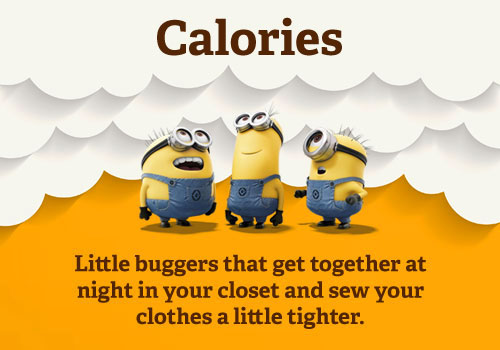
Siberian Huskies are medium-sized dogs and their average male generally weights around 44-60 lbs while a female Husky weights about 35-51 lbs.
Since calorie requirement directly depends on age as well as weight of the dog, we are considering the average weight of Husky is 50 lbs for the estimation.
The typical adult Husky weighting 50 lbs needs about 1150 calories per day but, it still depends on a Husky’s activity level and daily routine.
Active dogs need a lot of exercise and indoor activities to keep them healthy and fit thus, dog experts recommend giving them 1800 calories per day. The older dogs are less active so they require less food and only need 1000 calories per day.
Note: Above estimated calorie requirements are primarily based on an average weight of Husky dogs. Before making any significant changes in your dog’s diet, please consult with your veterinarian.
To support your Husky’s physical health, energetic lifestyle and athletic body, supply him with protein-rich high-calorie diet. While these caloric figures are averages, it is important to monitor your dog’s daily activity, body weight and energy level. Food portioning should also be monitored to avoid overfeeding.
They must be fed accordingly to avoid them to become overweight or suffer bloating. Still, you can reward your Husky with occasional chews and treats but, keep to a minimum.
Like humans, dogs can be obese, which may trigger various health-related problems and can reduce their quality of life.
Micronutrient Requirements for Huskies
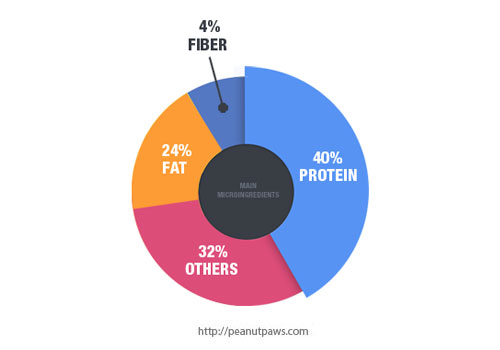
Huskies are pack dogs and they need a strong owner who can be the leader of the pack. They are confident, strong-willed dogs and are always enthusiastic and powerful.
To keep up with their active lifestyle, they will need a high-protein diet and other essential micro nutrients.
Protein
Protein is an essential part of any Husky’s diet because it helps them with building strong muscles and repairing old tissues.
Although AAFCO recommends minimum 18% protein in a Husky’s daily diet but many nutritionists suggest giving protein in the range of 25%-35%.

However, a lot of Husky enthusiasts differ with them on this opinion and suggest giving them 40%-50% of the protein to support their energetic lifestyle.
In fact, increasing the ration of protein in Husky’s diet is beneficial for his overall health. Dr. Dan Carey at Cornell University conducted a research supporting high-protein diet for dogs. He found that high protein diet lessens their chances of having physical injuries.
Take note that the protein sources are as important as the right amount of protein to be given to your Husky. While meat is their usual source of protein such as chicken and beef, fish are also a good source of it.
Just make sure that you are only giving your dog high-quality sources of proteins. Likewise, you can occasionally give him raw meat.
And because Siberian Husky dogs are athletic dogs in general, providing them with extra protein in their diet tends to increase their blood volume.
Fats
Another main source of energy is fat.
Good amount of fat is very beneficial for dogs as it keeps their skin healthy and coat shiny. Likewise, fat also plays an important role in digestion while promoting stable body temperature.
Moreover, fats are requisite in cell structure and keeping them functional.
According to AAFCO, you should include at least 10% of fat in your Husky’s daily diet, but as recommended by many experts, you should give 15%-25% of fat to your dog, depending on his energy needs and activity level.
Most dog foods contain a sufficient amount of fat as it is used to enhance the flavor, so most of the times you don’t have to worry about it.
It’s important to remember that not all fats are considered healthy for dogs. So make sure to give your dog healthy fats like Omega-3 and Omega-6. These are commonly used in quality dog food brands.
Essential fatty acids will not make your Husky obese instead, these nutrients will help them to stimulate their immune system, regulate cholesterol levels and prevent skin problems.
Vitamins and Minerals

No balanced diet for your dog would be complete without fruits and vegetables. These are great sources of vitamins and minerals which are indeed vital in keeping your dog’s immune system function.
Likewise, these nutrients help in preventing a wide array of health and behavioral problems to occur.
For an instance, Vitamin A helps in keeping your dog’s coat shiny, and at the same time, promotes eye health. This is very crucial since Huskies are prone to eye-related diseases such as Corneal Dystrophy.
Calcium is for healthy teeth, stronger joints and bones while Vitamin B9 prevents anemia. You can acquire these vitamins from milk and eggs. Moreover, certain fruits and vegetables are packed with antioxidants which contribute to good health.
Because of its numerous health benefits, most dog food manufacturers incorporate a wide variety of fruits and vegetables in their dog foods, so you can easily find one that will suit your dog’s preferences.
Remember that the more variety, the better since no single food carries all the imperative nutrients that the Siberian Husky needs. If the dog is not getting the proper amount of these, it increases their risk for various health diseases.
Carbohydrates
According to the experts, another must-have nutrient for all dogs is carbohydrates.
However, veterinarians nowadays suggest giving your dog very low carbohydrates. This is because most common sources of carbohydrates such as wheat, corn and soy can trigger allergic reactions in dogs.
Moreover, dogs cannot digest these food ingredients easily, so it’s recommended to avoid them as much as possible.
Even if you exclude carbohydrates from your dog’s diet completely, it will not deprive him of robust health. Many research have backed this claim that carbohydrate it not one of the necessary nutrients for dogs.
Still many dog enthusiasts believe that carbohydrates are essential as it promotes proper digestion.
Thus, we suggest you give your Husky controlled amount of carbohydrates daily. Instead of feeding him dog food containing soy and corn, give him high-quality sources such as barley, sweet potatoes and oatmeal.
Water

All these micro-nutrients will not be effective in maintaining your Husky’s health and growth without the help of water. Apparently it is the most important nutrient for dogs.
Water promotes proper digestion and absorption of nutrients from the foods they eat.
The amount of water a Husky need is based on various factors like activity level, exercises, age and of course, the weather.
Huskies needs to consume about 35-60 ounces of water based on their weight. Basically they need one ounce of water for every pound of their weight.
However, your dog may need more, especially if he is more active and playful. Thus, fresh and clean water should always be available for your Husky.
Aside from digestion, water helps in flushing out the toxin from your Siberian Husky’s body.
Since they are hyperactive and athletic, they tend to lose a notable amount of water quickly. To avoid dehydration and its complications, provide them with adequate amount of water. Preferably a Siberian Husky should have free access to water so they can maintain the water balance by drinking it when needed.
Ingredients to Avoid in Dog Food
While there are must-have foods for your Husky, there are also food ingredients to avoid such as low-quality proteins sources and low-quality grains.
Carefully read dog food labels when buying them to get rid of these ingredients. Expect that high-quality brand of dog foods are more expensive but, it is always worth it to prioritize your dog’s health and nutrition.
Due to their dynamic routine and enthusiasm, Huskies are prone to eat anything you will serve them. Make sure that you are giving your dog high-quality dog foods without meat-by-products, blood meal and bone meal as its ingredients.

Bone meal, also called bone manure, is basically a mixture of slaughterhouse waste product and ground animal bones. This is normally used as fertilizer for plants thus, it could be toxic for dogs.
Moreover, large amounts of dairy, corn, soy and wheat-based products should be strictly avoided.
Take note that meat-by-products are considered harmful for human consumption as these food ingredients usually come from expired meat products from supermarkets or even from dead animals.
Some meat-by-products come from road kills which apparently is unsafe for consumption. They are equally harmful for your dog too.
Husky dogs are known to reflect a basic balance of speed, endurance and power which make them a good house-dog. To sustain their capabilities, proper nutrients are must-have! Do not settle with low-quality food ingredients for your beloved dog.
Lastly, pay attention to dog food with artificial preservatives, food coloring and flavoring.
There are also dog food products that contain fillers. Fillers can damage the dog’s digestive tract. Also, these ingredients have little to no nutrients and calories but, manufacturers still use them because they are easily obtainable and cheaper.
Moreover, this may cause your dog gastric problems and digestive issues.
Common Health Problems in Huskies
In general, Siberian Huskies are healthy and fit dog breed. However, this doesn’t mean that they are not prone to health diseases.
Like any other dog breed, they are also prone to a set of health diseases that are mostly inherited or do not have adequate treatments yet.
Below are some of the most common health issues that Huskies are prone to. With proper nutrition, the right amount of food and plenty of exercise, you can help your dog avoid these diseases or lessen their risk of acquiring it.
Corneal Dystrophy

Corneal Dystrophy refers to the non-inflammatory clouding of the cornea or the outer surface of the eye. In severe cases, the dog may become blind.
By definition, this condition is considered a genetic disease but, the mode of inheritance is still unknown.
The symptoms include cloudiness of the cornea, bluish-white, grayish or crystalline looking opacification. It can appear close to the periphery or in the center of the cornea.
Seek the help of a veterinary ophthalmologist to render a specific diagnosis of corneal dystrophy if you suspect your dog to be suffering from it. No treatment has been found effective in treating this condition.
Entropion
Entropion is another eye disease which affects the upper or lower eyelids. This abnormal rolling inward of the lids is also an inherited trait which usually leads to swelling and pain in the eyes as a result of the irritation because of the eyelashes obtruding the cornea.
Entropion is common to Husky dogs as well as other “giant” breeds.
If not properly addressed, it may lead to vision impairment and loss of vision. Usually both eyes are involved.
A veterinarian or ophthalmologist is often enlisted in diagnosing and treating this condition by performing Blepharoplasty or a surgical intervention that will correct the deformity of the lid.
Hip Dysplasia

Hip dysplasia is considered common among large dogs but, is also usual in medium-sized to smaller dogs.
This is a genetic disease that can cause mild to severe changes in the function of the hip joint. It affects the proper alignment of the femoral head and the pelvis’ hip socket making it difficult for the dog to move.
While limping is the most apparent sign of hip dysplasia, not all dogs may exhibit symptoms.
Some may show early signs but, other dogs can still move without a problem as the symptoms appear later in their life. X-rays are conducted to properly diagnose hip dysplasia.
Other common health conditions that can affect your Huskies:
- Hypothyroidism – A malfunction in the thyroid gland.
- Cherry Eye – Health condition in Boxers caused by weakened tissues in the tear gland resulting in the gland popping out in a cherry-like shape on the dog’s eye.
- Heartworms – A serious and widespread canine disease.
- Kneecap Dislocation – Dislocation of kneecap from its position.
- Epilepsy – A genetic condition that can cause seizures in dogs.
Feeding Schedule for Husky Puppies and Adults

Siberian Huskies, when fully grown, can reach between 35-60 lbs and live from 12-15 years.
Since they tend to mature rapidly, it is essential that their owner should monitor their nutrition and growth. Appropriate feeding is critical for their overall health.
Although Huskies don’t have a large appetite, food portioning and scheduling is still of high importance.
From puppy’s birth to 3 weeks of age, the Dam’s milk is highly recommended food for them as it contains all the necessary nutrients a puppy needs for initial growth.
When they reach four weeks of age, you can start transitioning them from nursing to eating dog food for husky puppies. They are still not ready to eat solid food and unable to fully digest it, so make sure to give puppy food instead. Mixing the dry puppy food with milk or warm water is preferable. Feed them at least 3-4 times daily.
From 8 weeks onward, slowly switch them to solid food as this age marks the puppy’s rapid growth. They will need adequate nutrients to support their activities as well.
You can incorporate raw liver pieces in the usual dry puppy food, but feed them accordingly. Free-choice feeding method is not encouraged to avoid over feeding them that may lead to obesity.
As soon as a Siberian Husky turns six months old, transition the feeding toward the adult dog and feed him once in the morning and once at night.
Make sure that occasional treats are at a minimum. Shifting from one food to another must be done gradually from 7-10 days, so the dog will not experience stomach upsets. Mixed the old and new food together and increase the new brand’s portion every day.
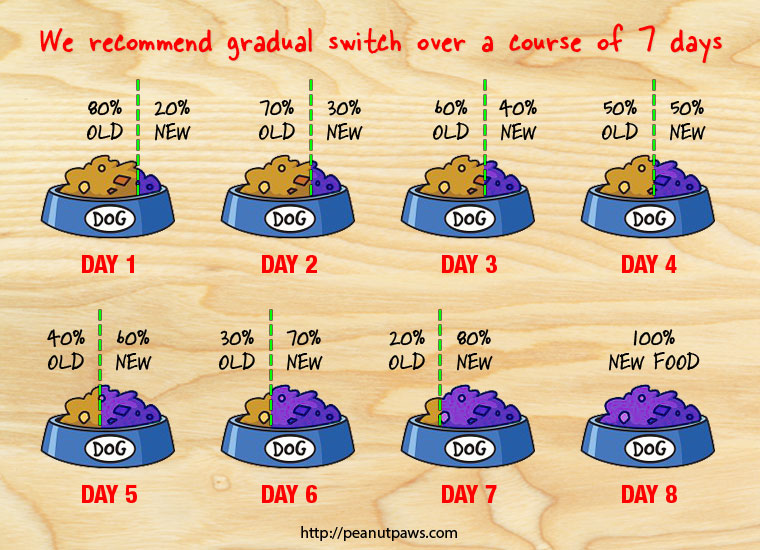
When they reached one year, Huskies are considered adult so they must be fed with dog foods of high-quality ingredients and according to their dietary plan. At this time, treats and chews should only be given as a reward.
Recommended Dry Dog Food for Huskies
Top Recommendation
EVO Turkey & Chicken Dry Dog Food

EVO dog food is also another good choice of dry dog food for Huskies.
The protein content is 42% which is ideal for Huskies and all of it comes from high-quality sources, such as turkey, chicken, chicken meal, salmon meal and menhaden meal.
These are some of the best quality protein sources for dog food. Chicken meal is essentially chicken but without moisture but has 300% more protein than raw chicken.
EVO dog food contains 26% fat and 27% carbohydrates which comes from peas, tapioca starch and dried chicory roots.
What I really like about EVO is that it has a good amount of vegetables and fruits, such as apples, tomatoes and carrots which fulfill requirement for range of vitamins and minerals. One more thing I like about it that it contains good quantity of fish oils.
It does not contain any inexpensive fillers and avoid using artificial preservatives, colors or flavors. Since it is a grain free dog food, it does not contain low-quality grains like wheat, corn, soy or gluten.
Overall, EVO dog food is a great option for Huskies and we highly recommend it. It is also the recommended dog food for German Shepherds.
Our Analysis
Pro
- High Protein Content
- Grain Free Food
- Lots of Animal Protein
- Fish Oils
- No Added Salt and Sugar
- No Artificial Preservatives & Chemicals
- No Fillers
Cons
- Little expensive than other cheap brands
EVO dog food is a grain-free meat-based dry dog food which uses significant amount of turkey, chicken, fish. It is one of the best dog food for available for Huskies. We highly recommend EVO dog food and award our 5 stars rating.
Worth Mentioning
Pinnacle Peak Protein Grain-Free Dog Food

When reviewing, we found Pinnacle Peak as one of the best dry dog food for your Siberian Husky dogs as it fulfills all the recommended levels of nutrients.
It is one of the few dog foods that successfully avoid all low-quality nutrition sources, such as mean by-products and fillers like corn and soy.
Pinnacle Peak is packed with whopping 42% protein, 22% fats and 29% carbohydrates all comes from quality sources, such as chicken meal, potatoes, salmon fish and eggs.
It also comes with lots of vegetables and fruit which are great sources of various vitamins and minerals for your Husky’s physical and mental health.
On top of that, it’s completely grain-free which is awesome because grains are known cause of many food related allergies in dogs. It also avoids using any types of artificial preservatives, colors or flavors.
So if you are looking for a high-quality grain-free dog food for your Huskies, then your search ends right here with Pinnacle Peak. You can trust this brand with your eyes closed.
Our Analysis
Pro
- High Protein Content
- Grain Free Food
- Lots of Meat Protein
- Fish Oils
- Lots of Vegetables & Fruits
- No Added Salt and Sugar
- No Synthetic Preservatives & Flavour
Cons
- Tomato Pomace (low nutritional filler)
- Little expensive than other cheap brands
Pinnacle Peak is a grain-free dry dog food that uses chicken and fish as main source of Protein. It is great choice for Siberian Husky, thus it earns our 5 star rating and a highly recommended dog food status.
Huskies are very well behaved dogs and they love to release their energy by roaming around and playing lots of games.
To keep up with their activity level, they need to feed high-quality dog food.
A nutritionally balanced dog food not only keeps your dog healthy but it also increases his life span and also improves the quality of life.
The best dog food for Huskies is the one that fulfills the requirement of all necessary nutrients for your canine.
Keep feeding high-quality dog food, monitoring weight and regular veterinary checkups is the key to healthy life.
Are you looking for recommended dog food for Boxers or dog food for Beagles. We have detailed guides on dietary requirements of various dogs.
*Disclaimer: Our review on dog foods is based mostly on our expertise and the experts/veterinarians we consulted with and the information provided by the manufacturers. We do test many dog foods, but it’s not possible to test them all. As such, please remember the above recommendations are our opinions, and before making any changes in your dog’s diet, please consult with a local veterinarian.
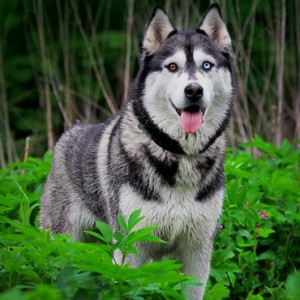
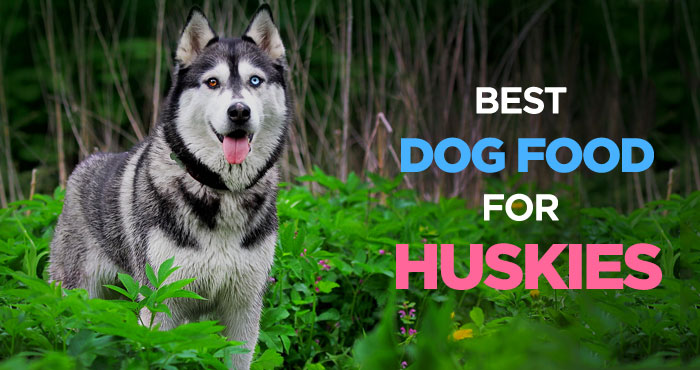
 Wild Calling Western Plains Stampede
Wild Calling Western Plains Stampede  Hill’s Ideal Balance Grain Free Dog Dry Food
Hill’s Ideal Balance Grain Free Dog Dry Food 








Very helpful. Thank you
I am glad you liked it. Thanks
Its helpful by still having trouble answering my question for tafe
Hi Melissa,
What questions do you have? Let me know.
I love huskies because I have got one at my house.
🙂